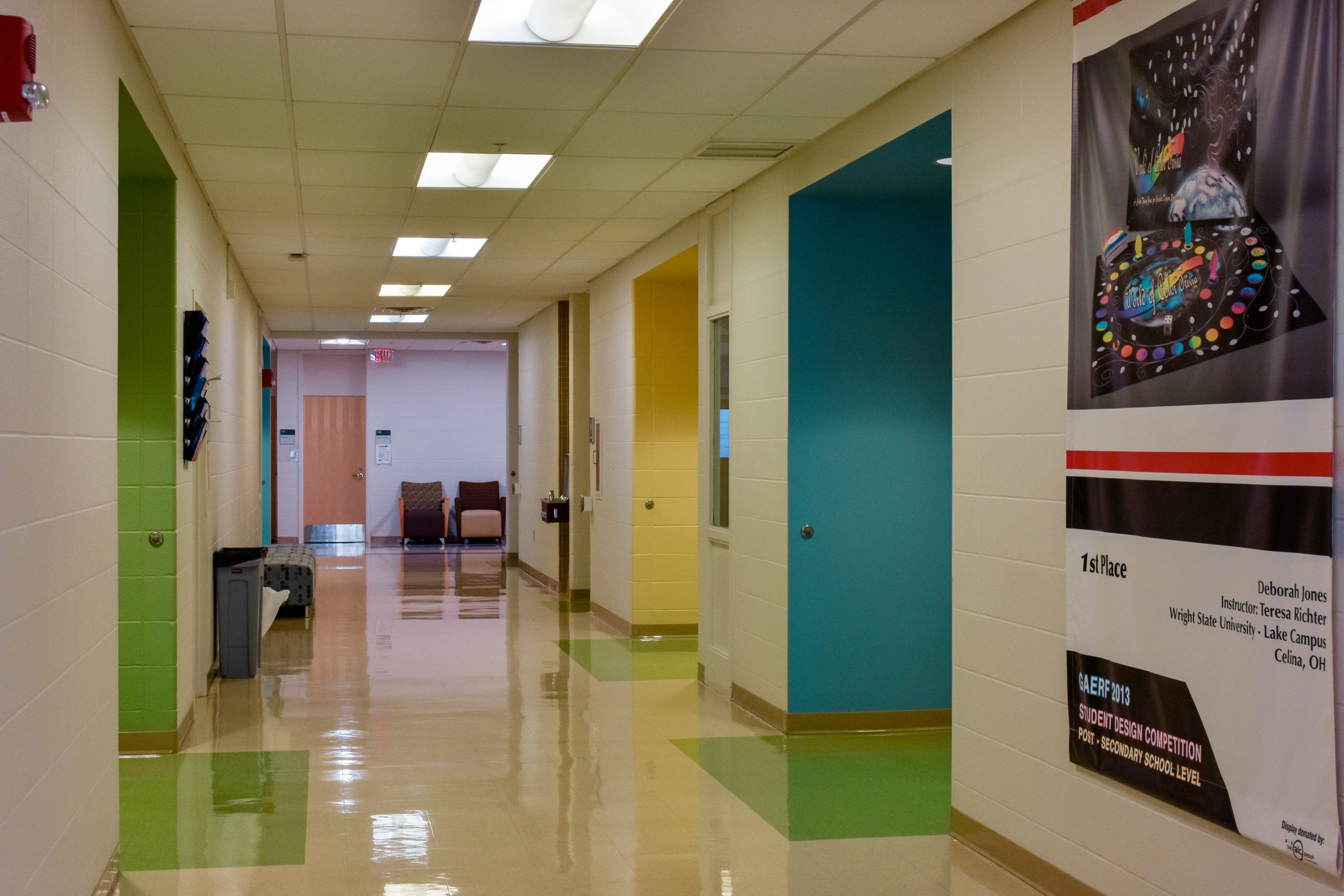
Lake Campus hallway | Photo by Shannon McCabe, edited by Soham Parikh | The Wright State Guardian
The Lake Campus has several services from the Wellness Outreach Program each month, counseling and Safe Spaces to offer students.
Wellness Outreach Program
The Wellness Outreach Program was started in 2016 as a way to bring awareness to individuals; not only students, but also staff and faculty, about what resources are available within the community for healthier lifestyles.
There are different topics and sponsors each month. The program is hosted throughout the fall and spring semesters at the Lake Campus. It is located at the Lower Level (outside the Boathouse and Bookstore) and is free of charge.
The upcoming topics are:
January–
Our Home Family Resource Center (OHFRC) will highlight their Direct Services & Referral Program, which strives to help you find and receive support during times of need. They will also have information about their food pantry!
February-
Mercer Health will be here with their Body Composition Analyzer to perform free screenings. In under one minute, the analyzer will provide a breakdown of your weight including: lean body mass (muscles), fat, minerals and body water status. The results will help guide you to better achieve your goals and make meaningful lifestyle changes.
March-
Our counselor, Kim Altstaetter, will be available with information about mental health (depression, partner/domestic violence, suicide prevention, etc.).
According to Beth Wells, BSN, RN, and head of Health and Wellness Services, “the individuals at these events are experts within the presented areas. They are there to provide you with valuable information and answer any questions you may have. The information is free for the taking!”
Counseling services
Counseling services are available at the Lake Campus through Kim Altstaetter, the Wright State Lake Campus Counselor.
The services are available to students for free and they are eligible for up to six sessions per semester. If a student requires long term services, the counselor will assist in making a referral to local community services.
Kim Alstaetter, LPCCS, CDCA (Licensed Professional Clinical Counselor Supervisor, Chemical Dependency Counselor Assistant) has been providing her services at the Lake Campus since 2015. Her schedule is as follows:
Monday: 10 a.m. – 1 p.m.
Thursday: 1 – 4 p.m.
If a student can’t make it during those times, they are encouraged to email Kim Alstaetter at kimberly.altstaetter@wright.edu. If a student does not want to meet with the on-campus counselor, the counselor can assist them in finding local resources to meet their needs and their insurance benefits.
Counseling can assist students in managing emotions, dealing with relationship issues, dealing with addiction issues and coping with life adjustments. Each individual’s reason for seeking services is unique to their situation.
“Counseling is a judgement free place to express your thoughts and feelings. I embrace each person’s unique qualities and assist students in finding their strengths and learning ways to cope with the obstacles in the way of them achieving their goals,” said Altstaetter.
Safe Spaces
According to Merriam-Webster, a Safe Space is defined as “a place (as on a college campus) intended to be free of bias, conflict, criticism, or potentially threatening actions, ideas, or conversations.” At the Lake Campus, Safe Spaces are available to students through faculty or staff that have been trained about Safe Spaces.
Some professors include a blurb about Safe Spaces in their syllabus in order to let students know they are Safe Space Trained. Other may have magnets or stickers on the outside of their doors. This program is not required for educators, it is all volunteer based. Training is done periodically when there is enough interest.
This resource provides students with someone or someplace to express their views and opinions without fear of being judged by those trained in Safe Space practices.
“If students want to get to more resources, they have somebody they can trust to ask about them… people deserve any safety that they can find if that’s what they need or want,” said Dr. Christine Junker, associate professor of English.
While Safe Spaces are available to students at the Lake Campus, students are gently reminded that those not trained in the topic may not share the same views as those who are Safe Space trained.
- Top 10 assigned reads that are worth the time
- Laker Baseball: Back in Action to Rebuild
- 419 Alive: The Anchor
